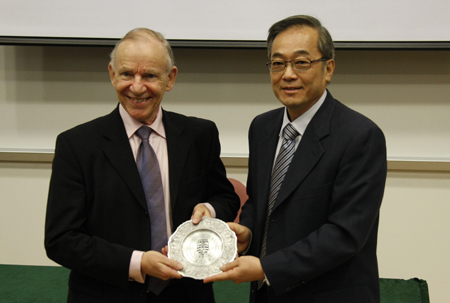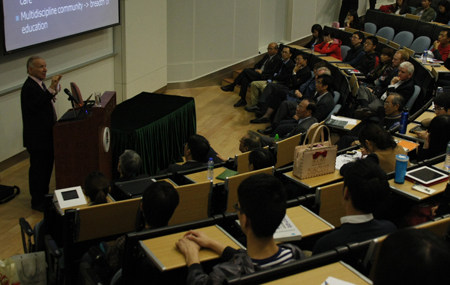Dr Andrew Graham, acting warden of Rhodes House at the University of Oxford, gave a lecture on the collegiate university at the University of Macau (UM) on 15 March. This was the fifth lecture of the Liberal Arts Learning Series at UM. In his lecture, Dr Graham talked about the University of Oxford, in particular, about its colleges, how these colleges work, and why this collegiate structure makes the education at Oxford so special and gives Oxford a comparative advantage.
Dr Graham is the acting warden of Oxford’s Rhodes House, which is a body responsible for overseeing the many Rhodes Scholars who study at Oxford. He is also director of the Scott Trust (owner of The Guardian and Observer newspaper), senior fellow of the Oxford Internet institute (OII) and chairman of the Academic Council of the European Universities (an association of ten leading European universities).
Before his lecture, Dr Graham introduced himself that he was the master of the Balliol College, which was founded in 1263 and which is one of the oldest and most famous colleges at Oxford and also a leader in liberal arts education. In the lecture, Dr Graham mainly talked about four main issues, including “what does a university do and why”, “how might colleges help”, “what happens at Oxford” and “what’s the interest to Macao”. Dr Graham said that a university mainly does research and teaching. Equally, if not more importantly, it contributes to society by helping students to think for themselves, but not just of themselves. Colleges can help in different aspects, for instance, they can offer multi-disciplinary education and decentralise the power for teachers to do research. Traditional universities are dominated by disciplines of literature, physics, law and medicine. But at Oxford, every college contains all of the four disciplines. For each Oxford college, graduates are administered by the university and undergraduates are administed by a college. As for the students at Oxford, each undergraduate student is supposed to give three to eight lectures and help run the colleges. As for the challenges for Macao, Dr Graham pointed out that Macao’s still “treading on stones”.
In the Q&A session, one student asked about the difference between Oxford and Macao. Dr Graham answered that predominantly residential colleges in Macao do not give lectures, but residential colleges at Oxford do. Another student asked how to balance the time between college and university. Dr Graham said students should learn how to manage their time through experimenting. Dr Graham noted that it is more important to learn how to learn at university, because the knowledge one gains from university education is very likely to become useless in about four years.
Reported By Zheng Jiajia, UM Reporter
Should you have any inquiries about the press release, please feel free to contact Ms. Veronica Tang at(853)8397 4323 or prs.media@um.edu.mo or visit UM webpage www.umac.mo.


